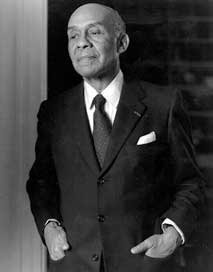

 |
 |
 |
OCB Home Page Board of Directors Oklahoma Book Awards Newsletters Literary Map of Oklahoma |

The Ralph Ellison Award

The Ralph Ellison Award was created by the Center to posthumously honor individuals who have made outstanding contributions to Oklahoma's literary heritage.
2013
Alexander Lawrence Posey, a Creek poet, journalist, and essayist was born August 3, 1873, in Indian Territory near present-day Eufaula. He would live only 34 years before his death by drowning on May 27, 1908, but it was a remarkable 34 years.
Intelligent and ambitious to serve, he moved quickly from student to educator, writing poetry and essays along the way. Daniel F. Littlefield, Jr. writes in his biography Alex Posey: Creek Poet, Journalist and Humorist (University of Nebraska Press, 1997):
Although he claimed he did not speak English until age fourteen, he had received sufficient American-style education at the Creek national boarding school at Eufaula to enter Bacone Indian University at sixteen. There he acquired his literary tastes and began to write, publishing enough works to establish a local literary reputation by the time he left the university in 1894. The next year, at age twenty-two, he was elected to the House of Warriors, the lower chamber of the Creek National Council, as representative from Tuskegee, his tribal town, and was also appointed superintendent of the Creek Orphan Asylum at Okmulgee. At age twenty-four he had become superintendent of public instruction for the Creek Nation; at twenty-six, superintendent of the Eufaula boarding school; and at twenty-seven, superintendent of the national boarding school at Wetumka. In 1901 he left Creek national service for good.
In 1902 he turned his attention to journalism and political commentary, purchasing the Indian Journal, a weekly newspaper in Eufaula that he edited until its sale in 1904. In 1904 he became a field worker for the Dawes Commission. In 1905 he served as secretary at the Sequoyah Convention in Muskogee as the tribes worked to draft a constitution.
His widely circulated satirical newspaper columns, under the pseudonym Fus Fixico, from 1902–1908, are today considered his most outstanding literary achievement. Historian Linda D. Wilson writes that the column “presented the dialogues of fictional characters, Fus Fixico and his full-blood Creek friends, who discussed land allotment, tribal termination, and impending statehood, which would end their way of life.”
The columns, presented as Letters to the Editor, provided both astute and humorous comment on the politics, and economic and social conditions in Indian Territory. They were compiled and published as The Fus Fixico Letters (University of Nebraska Press, 1993). Also published: The Poems of Alexander Lawrence Posey (Crane, 1910, Hoffman, 1969).
2010
Author and historian Stan Hoig became one of the most prolific writers of the American West. A native Okie, Hoig was raised in Gage, Oklahoma, and joined the Army Air Corps in 1943, serving three years during World War II. Following his tenure in the military, he returned home and received a bachelor’s degree in English from Oklahoma State University, and later received a master’s degree as well as a doctorate degree from the University of Oklahoma.
Hoig began his career writing articles and books on the American West in the 1950s. His first book, The Humor of the American Cowboy, was published in 1958 and remains in print today. Hoig published a wide variety of articles in magazines and professional journals such as the Chronicles of Oklahoma and Encyclopedia of the American West. Moreover, he had twenty-five books published and listed with the Library of Congress including The Sand Creek Massacre, The Battle of the Washita, Perilous Pursuit: The U.S. Calvary and the Northern Cheyennes, and The Chouteaus: First Family of the Fur Trade.
Hoig’s expertise on the American West led him to become advisor to several television productions including the Discovery Channel’s “The Way the West Was Lost,” “Real West,” A&E Channel’s “Southern Cheyennes,” and the British Broadcasting Company’s “Land Runs of Oklahoma.”
Hoig enjoyed a distinguished teaching career, serving as a professor of journalism at the University of Central Oklahoma. He was the recipient of numerous awards including the Muriel H. Wright Award, the Edmond Historical Society Roll of Honor, Oklahoma State University Clement E. Trout Writing Award, and the American Association of University Professors Distinguished Scholar Award.
Hoig received the Oklahoma Book Award in the Children/Young Adult category in 1991 for A Capitol for the Nation. He was honored four additional times as a finalist for the Oklahoma Book Award: three times in Non-fiction for The Cherokees and their Chiefs: In the Wake of Empire (2000), White Man’s Paper Trail: Grand Councils and Treaty-Making on the Central Plains (2007), and The Chouteaus (2009); and once again in the Children/Young Adult category for It’s the Fourth of July (1996).
2008
Professor Danney Glenn Goble was a rare person, a seamless blend of teacher, scholar, and friend. His brilliant intellect and biting humor were balanced by humility and generosity of heart. He often defied convention.
An exceptionally gifted teacher, he made Oklahoma history and politics come alive to his students. They respected, admired, and adored him. He taught at Tulsa Junior College (now Tulsa Community College), Rogers University (now Oklahoma State University–Tulsa), the University of Tulsa, and the University of Oklahoma. He was recognized with several teaching awards.
Danney Goble earned his undergraduate degree at University of Central Oklahoma and his master’s degree at OU, but he discovered that Oklahoma history was “real history” while he was earning his doctorate at University of Missouri. As an Oklahoman he was keenly aware of the inferiority complex that many Oklahomans tend to have about their state. He worked hard throughout the remainder of his adult life to help Oklahomans become better acquainted with their state’s history, especially the colorful events of the twentieth century. He traveled all around the state to speak about Oklahoma history wherever he was invited—in classrooms, libraries, civic groups, seminars, and conferences.
Author or co-author of eight books, he was a scholar who wrote with the polish of a professional writer, unmatched in his ability to tell a good story. This is particularly evident in two collaborative works, Little Giant: The Life and Times of Speaker Carl Albert, which won the Oklahoma Book Award and was nominated for a Pulitzer Prize, and A Matter of Black and White: The Autobiography of Ada Lois Sipuel Fisher, which was named the outstanding book in political science by the National Conference of Black Political Scientists. He also collaborated very successfully with David Baird in writing The Story of Oklahoma, a high school textbook that has been adopted by many public schools, and with Bob Goins on the award-winning fourth edition of Historical Atlas of Oklahoma. At the time of his death, he was co-authoring with Mike Cassity a book on the history of Presbyterianism in Oklahoma.
Danney’s first book, Progressive Oklahoma: The Making of a New Kind of State, remains a classic for its description of the impact of Oklahoma Territory and Indian Territory on the development of political traditions in the state.
2007
It is fitting that Muriel Wright be recognized in the year of Oklahoma’s Centennial. She has been acclaimed as both making and preserving the history of our state. She wrote or co-authored 12 books on Oklahoma, and from 1955 to 1973, she served as editor of The Chronicles of Oklahoma, a journal published by the Oklahoma Historical Society, shaping it into a well-regarded publication.
She described her identity as thoroughly American: one-fourth Choctaw and from distinguished colonial ancestry. She traced her genealogy to descendents aboard the Mayflower in 1620. Wright was born in Lehigh, Choctaw Nation, in 1889. Her grandfather was Allen Wright, chief of the Choctaw Nation from 1866 until 1870, and the man credited with coining the name “Oklahoma” from two Choctaw words translated as “Red People.”
Among Muriel Wright’s literary achievements is the four-volume work Oklahoma, a History of the State and its People (1929) written with Joseph Thoburn. This was and still is the most comprehensive study of the state’s history and biography. Three of her other books: The Story of Oklahoma, Our Oklahoma, and The Oklahoma History were adopted by the state textbook commission for the public schools. She also wrote A Guide to the Indian Tribes of Oklahoma and, with historian LeRoy Fischer, Civil War Sites in Oklahoma.
Upon her retirement in 1973, George Shirk, board president of the Oklahoma Historical Society, said, “The thought of the gap that would have been left in Oklahoma history, had it not been for her work, makes me shudder.”
Her awards and honors include: Oklahoma Hall of Fame, Hall of Fame of Famous American Indians, Oklahoma Historical Society Historians Hall of Fame, the University of Oklahoma Distinguished Service Citation, and an Honorary Doctorate from Oklahoma City University. She was also named Oklahoma City Woman of the Year in 1951. In 1971, Wright was named Outstanding Indian Woman of the Twentieth Century by the North American Indian Women’s Association.
2006
A native of Pawhuska, Oklahoma, John Joseph Mathews (1895–1979), grew up among the Osage and developed a respect and admiration for his native people. One of his earliest recollections as a child was hearing an Osage Indian prayer-chant to the morning star. Following his service in the United States Air Force during World War I, Mathews returned to Oklahoma and received a bachelor’s degree in geology from the University of Oklahoma. He graduated from Oxford University in 1923, as one of the school’s first graduates with Native American heritage. Mathews later worked as a realtor in California, until he became a rancher and began devoting his time to writing.
Mathews authored both fiction and non-fiction books. His work focused primarily on southwestern history and particularly the Osage Indians. He became one of the early writers to be concerned with the loss of traditional Native American culture. His books include Wah’Kon-Tah: The Osage and the White Man’s Road, Talking to the Moon, Life and Death of an Oilman: The Career of E.W. Marland, and The Osages: Children of the Middle Waters. His novel, Sundown, is somewhat autobiographical. The book’s main character is Challenge Windzor, a young man born and raised on an Oklahoma reservation, who has difficulty blending his Indian heritage and white culture.
Throughout his life, Mathews continued to preserve the history of the Osage people and their culture. He served as a member of the Osage Tribal Council from 1934 to 1942, and played an integral role in the development of the Osage Tribal Museum in Pawhuska. He died in June 1979. The Oklahoma Historical Society honored Mathews for his work in preserving the history of Oklahoma and the Osage people by posthumously inducting him into the Oklahoma Historians Hall of Fame.
2005
Born in Okemah, Oklahoma, and known as the Dust Bowl Balladeer, Woody Guthrie was both “common man” and “renaissance man.” In his prose and song, he illuminated some of the most significant and troubled periods of the twentieth century—the Great Depression, the Great Dust Storms, and World War II.
Guthrie wrote more than a thousand songs—dust bowl ballads, union songs, children’s songs, patriotic songs, anti-fascist songs, and songs celebrating the beauty and power of America—including the masterpiece This Land is Your Land. Guthrie’s concerns as a songwriter and his approach to the form have had a far-reaching and enduring impact on popular music.
His famous semi-autobiographical work, Bound for Glory, was published in 1943. He has been inducted into The Songwriters Hall of Fame (1971), The Nashville Songwriters Hall of Fame (1977), and The Rock and Roll Hall of Fame and Museum (1988). In 2001 the community of Okemah was named a Literary Landmark in honor of Guthrie by the Friends of Libraries in Oklahoma (FOLIO).
In 1954, suffering from Huntington’s Chorea, a degenerative disease, Woody admitted himself into Greystone Hospital in New Jersey, one of several that he would go in and out of for the next thirteen years. While at Creedmoor State Hospital in Queens, New York, Woody Guthrie died on October 3, 1967.
2004
Rollie Lynn Riggs is probably best known as the author of Green Grow the Lilacs, the play that Richard Rodgers and Oscar Hammerstein II used as the basis for their groundbreaking musical Oklahoma! While Lilacs opened on Broadway in 1931, and had a limited eight-week engagement (before going on the road), its 1943 musical adaptation was the first Broadway show to run for over 2,000 performances, and was later translated into a motion picture.
During the first half of the twentieth century, Lynn Riggs was the only active American Indian playwright , and by the end of his life, he had written thirty plays. Once an aspiring Hollywood actor, Riggs also worked on scripts for fourteen films produced between 1930 and 1955. His best known work includes co-writing Cecil B. DeMille’s Gary Cooper Western, The Plainsman, and two installments of the Basil Rathbone and Nigel Bruce Sherlock Holmes series.
Riggs was born on August 31, 1899, in the Cherokee Nation, a few miles southwest of Claremore, Oklahoma. His mother Rosie was one-eighth Cherokee, and had registered herself and her children on the Cherokee rolls. His father William was a prominent cattleman and banker.
As a youth, Riggs held a variety of jobs, including cowhand and singer in local movie houses. He later moved to New York, where he worked as a proofreader at the Wall Street Journal, and clerked for Macy’s department store. Beginning in 1920, Riggs attended the University of Oklahoma, where he was poetry editor for the University of Oklahoma Magazine, and taught freshman English. In 1923, Riggs first play, Cuckoo, was produced at the university.
Riggs’s first play to be produced in New York was The Big Lake in 1927, which the American Laboratory Theatre presented to mixed reviews (despite a cast that boasted Stella Adler and Harold Hecht). In 1928, Riggs received a Guggenheim Fellowship. While in France on that fellowship, he began writing his two most important plays, Green Grow the Lilacs and The Cherokee Night. Both plays were set in Indian Territory, in the last decades of the nineteenth and first decades of the twentieth centuries, depicting ordinary people struggling in a hard and unyielding land during a time of rapid, unsettling change.
Riggs also wrote such plays as The Lonesome West, The Cream in the Well, Laughter from a Cloud, Russet Mantle, and Borned in Texas. Lynn Riggs died of stomach cancer on June 30, 1954.
2002
The 2002 recipient of the Ralph Ellison Award is John Berryman, poet, biographer, and editor. Born October 25, 1914, Berryman spent the first ten years of his life near McAlester, Oklahoma.
He earned an A.B. degree from Columbia University and a B.A. in 1938 from Clare College, Cambridge. Considered by many to be a brilliant teacher, Berryman taught literature at Wayne State, Harvard, Princeton, the University of Washington, and the University of Cincinnati. In 1955, he was appointed Regents Professor of Humanities at the University of Minnesota, where he spent the last years of his life.
With the publishing (in book form) of Homage to Mistress Bradstreet in 1956, John Berryman gained wide recognition and praise for originality as he began working within the voices of diverse personae. In Bradstreet, which was nominated for a Pulitzer Prize, he imagines and inhabits the dramatic voice of Early American poet Anne Bradstreet.
77 Dream Songs, for which he won the 1965 Pulitzer Prize, is widely considered a masterpiece—an essential work that continues to set him apart from any other poet. A series of sonnet-like poems, this book is a harrowing and intimate exploration of the depths of a human soul using a number of memorable and sometimes comic alter egos (including “Henry” and “Mr. Bones”). Berryman continued to add to this sequence of poems, and the complete Dream Songs eventually numbered nearly 400.
His Toy, His Dream, His Rest (a companion piece to 77 Dream Songs) won the National Book Award (1969) and the Bollingen Prize. Other important works include Berryman’s Sonnets, Love and Fame, and his novel Recovery.
Berryman received two Guggenheim Fellowships (1952 and 1966) during his career. He was elected a Fellow of the Academy of American Poets in 1966 and served as a Chancellor from 1968 until his death.
Berryman, who never recovered from the childhood shock of his father’s suicide, was prone to emotional instability and heavy drinking throughout his life. Tragically, he ended his own life on January 7, 1972.
2000
Born September 27, 1906, Anadarko native James Meyers Thompson used his experience—growing up in the Depression, working the Texas oil fields, gambling, and drinking—to become renowned as one of this country’s finest pulp novelists.
Thompson found an original voice in the crime genre. The darkness of his vision quickly set him apart from others in the field. Possibly Thompson’s best known novel—The Killer Inside Me—is the story of a doomed small-town sheriff unable to control his blood lust as circumstances compel him to kill and kill again. Thompson authored no fewer than 29 novels. A number of his books have been made (and remade) into movies, including The Killer Inside Me, The Getaway, Coup de Torchon (based on Thompson’s Pop. 1280), The Grifters, and After Dark, My Sweet.
Known as a journalist, as well as fiction writer, Thompson directed the Federal Writers Project in Oklahoma during the 1930s, and later worked for the New York Daily News and Los Angeles Times Mirror.
In the mid-fifties, Thompson began working in Hollywood. He worked with Stanley Kubrick on screenplays for two of the director’s seminal films, The Killing and Paths of Glory. Despite a promising beginning, Thompson’s remaining film career was marked by unproduced screenplays, and some writing for undistinguished television series. These years were marred by alcoholism and chronicled in his works The Alcoholics and Bad Boy.
When he died April 7, 1977, at the age of 71, none of Thompson’s novels remained in-print in this country. However, critical opinion of his novels has grown steadily since his death. Today, Jim Thompson’s work is considered alongside that of Raymond Chandler, Dashiell Hammett, and James M. Cain—writing that transcends genre.
1998
Melvin Tolson was a poet, journalist, and dramatist. Tolson was born February 6, in 1898. He attended Fisk University and earned a B.A. with honors from Lincoln University in 1923. Tolson earned an M.A. from Columbia University in 1940.
He lived in Guthrie, Oklahoma, and in nearby Langston, where he served as mayor from 1952 until 1958. He was professor of creative literature at Langston University and director of the Dust Bowl Theater from 1947 until 1965.
Tolson won first place in the American Negro Exposition National Poetry Contest in 1939 for “Dark Symphony” and was Poet Laureate of Liberia in 1947. He was honored at the Library of Congress, the White House, and the Tuskegee Institute. In May of 1965, the American Academy of Arts and Letters presented him with the annual poetry award.
He wrote a weekly column for the Washington Tribune, and a compilation of these articles was published under the column’s title, Caviar and Cabbage. Other works include: Rendezvous with America, Libretto for the Republic of Liberia, and A Gallery of Harlem Portraits.
Tolson died in Dallas, Texas, August 29, 1966, and is buried in Guthrie.
1997
Angie Debo was a historian who lived near Marshall, Oklahoma, from the time she was nine years old. She was known as, and remains, the “first lady of Oklahoma history.”
Debo was born on January 30, 1890, in Beattie, Kansas. When she was 16, she obtained a rural school license and later earned an A.B. degree from the University of Oklahoma in 1918, an A.M. degree from the University of Chicago in 1924, and a Ph.D. from the University of Oklahoma in 1933.
She was inducted into the Oklahoma Hall of Fame in 1950 and won a Western Wrangler Award in 1978 for Geronimo: The Man, His Time, His Place.
Her other works include: The Rise and Fall of The Choctaw Republic, And Still the Waters Run: The Betrayal of the Five Civilized Tribes, The Road to Disappearance: A History of the Creek Indians, and Oklahoma: Foot-Loose and Fancy-Free.
Angie Debo died in 1988.
1995
 Ralph (Waldo)
Ellison was born on March 1, 1914, in Oklahoma City, Oklahoma. His
father, a small businessman who died when the boy was three years old,
was said to have wanted his son to be a poet, and named him after Ralph
Waldo Emerson. His mother was a domestic worker who is often recognized
for recruiting blacks into the Socialist Party.
Ralph (Waldo)
Ellison was born on March 1, 1914, in Oklahoma City, Oklahoma. His
father, a small businessman who died when the boy was three years old,
was said to have wanted his son to be a poet, and named him after Ralph
Waldo Emerson. His mother was a domestic worker who is often recognized
for recruiting blacks into the Socialist Party.
In 1933, aiming for a music career, Ellison began studying at Tuskegee Institute. In 1936, he moved to New York City to study sculpture. Instead, he met Richard Wright, and became associated with the Federal Writers’ Project, writing short stories and articles for magazines such as New Challenge and New Masses.
During World War II, while serving in the Merchant Marines, Ellison published several more short stories. After the war, Ellison envisioned writing a war novel, but, instead he began the seven year process of writing his only novel, Invisible Man.
Published in 1952, Invisible Man won the National Book Award for 1953, and brought the author international fame and a permanent place as a respected American writer.
The book mixes naturalistic, expressionistic, and surrealistic styles to relate the events leading to a young black man’s alienation and ultimate isolation. The novel is admired as a treatment of racial repression and betrayal, a satire of mid-century life in Harlem and the American South, and finally an affirmation of the need for individual self-awareness. Widely regarded as a masterpiece, it remains one of the central texts of the African-American experience.
His other major works are Shadow and Act (1964) and Going to the Territory (1986), collections of his essays, interviews, and fragments of autobiography. After teaching at various universities, he became the Albert Schweitzer Professor in the Humanities at New York University (1970—79). He was awarded the Presidential Medal of Freedom in 1969.
Ellison, who married Fanny McConnell in 1946, died of pancreatic cancer on April 16, 1994. He is buried in New York City.
![]()
Copyright � - All Rights Reserved
Oklahoma Department of Libraries